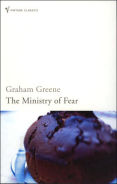Author of over 25 novels, Greene brought his complex view of human nature to whatever genre he chose as his starting place. While he famously separated his oeuvre into serious novels and “entertainments”, he nevertheless imbued even the lightest of stories with a dark undercurrent of moral ambiguity. While he is often called a Catholic writer since several of his novels feature protagonists and themes that are overtly Catholic, Greene took his exploration of moral issues well beyond Catholic doctrine.
This early novel, published in 1945, is a thriller which employs the now-common trope of an ordinary man stumbling into a morass of international intrigue. He has to figure out what is going on while trying to rescue himself (and usually another; oh, and possibly the world).
In wartime London, Arthur Rowe impulsively attends a church fête, drawn by memories of his innocent childhood. It’s a rather sad affair, with few booths, but some of his anxieties are eased as he tries the games. He makes a wild guess at the weight of cake, said to have been made with real eggs, before ducking into the fortune teller’s booth. He ends up walking away with the cake.
It is not an ordinary cake, though, and Arthur is not exactly an ordinary man. He’s been living a half-hearted life in a rooming house since his release from prison where he’d been sent for the mercy killing of his beloved but ill wife.
He is pursued by the people involved with the cake, though he only gradually begins to understand his danger. The kaleidoscope shifts constantly as he tries to determine who to trust and what their motivations are. Even identities shift constantly. The stakes are raised as he is dragged from his self-imposed isolation and begins to care about others.
Greene reflects Rowe’s dilemma in two opposing forces. The first is the Blitz. The nightly bombing raids not only ratchet up everyone’s anxiety level but also continually rearrange the fabric of their lives. Buildings disappear; streets are rerouted. If you turn a corner, the street may or may not be passable. If you call someone, the phone may or may not ring. If you go to their home, the house may or may not be there. People abandon their bedrooms to sleep in shelters.
The second is a children’s book, The Little Duke, by Charlotte M. Yonge, which Rowe also carries home from the fête. In the story young Richard of Normandy becomes the duke when his father is killed. He must learn whom to trust: those who flatter and cajole him or his father’s trusted lieutenants who tell him hard truths. He is betrayed and kidnapped, yet his trials teach him to do what is right; he learns how to be both brave and gentle. Although some of his people are puzzled when he forgives his enemies, they love the little duke for it and support him without fail.
While not didactic, the story is obviously meant to be instructive, with its themes of honor and glory: that maintaining your honor by doing good will bring you glory in war and in the hearts of your countrymen.
Such childish illusions were shattered in the trenches of the Great War, and shattered again for a new generation in the war against fascism that is the setting for Greene’s story. A more nuanced understanding of good and evil is required.
Like Rowe, we are asked to leave behind the comfortable certainties of childhood to navigate this adult world where everyone has secrets and reality is always shifting. As Yonge put it, we must find “the only safe way across the morass, and a very slippery, treacherous, quaking road it was.” The tension that is created between the broken and uncertain present and the sweet simplicity of the past amplifies Rowe’s predicament. And what could be more relevant to the situation we find ourselves in today?
Also relevant is the title, which refers to one way Germans are said to control the fifth columnists working against England in the war. They come up with something on them, forgive it, and then control them with the threat of blackmail. As one character explains, “‘They formed, you know, a kind of Ministry of Fear—with the most efficient under-secretaries. It isn’t only that they get a hold on certain people. It’s the general atmosphere they spread, so that you can’t depend on a soul.’”
These days it is hard not to look around and wonder who is being paid or blackmailed, if the people in power are taking orders from our enemies and selling out their country. Amid threats and firings and lies, we must stand up to the Ministry of Fear that threatens our fragile covenant.
Have you read anything by Graham Greene? He was one of the most popular novelists of the 20th century. Do you find his work relevant to today’s world?

